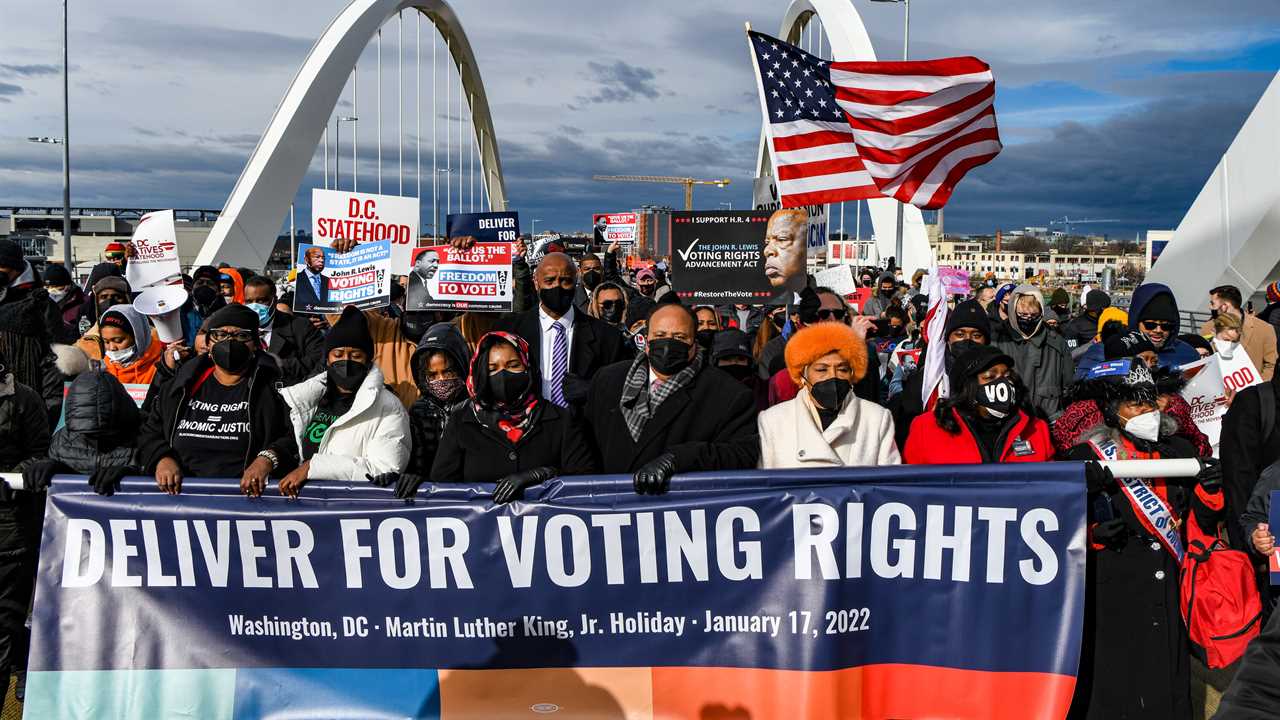
WASHINGTON — Each year, the Rev. Dr. Martin Luther King Jr.’s birthday is commemorated with marches, services and speeches. But the annual peace walk across the Frederick Douglass Memorial Bridge had an additional purpose on Monday: pushing the Senate to pass new voting rights legislation.
The holiday came one day before the Senate returns to debate what is expected to be a doomed effort to pass the legislation. Despite the near certain defeat, voting rights activists, Democratic officials and relatives of Dr. King said they were not giving up.
“I hope they do the right thing tomorrow,” said DaMareo Cooper, the co-chairman of the Center for Popular Democracy, a progressive advocacy group. “But if not, expect to hear from our communities. Expect for this not to just be something that you get to do and hide behind the filibuster.”
He added: “We are paying attention. We will be in the streets. We will protect our rights.”
Speakers at a news conference after the march sharply criticized members of the Senate and President Biden for their failure to enact voting reforms as they focused on other Democratic priorities — and as voters’ rights have eroded under Supreme Court rulings and laws passed by Republican state legislatures that make it harder for people of color to vote.
“We’ve seen what President Biden and Senate Democrats can do when they commit,” said Arndrea Waters King, the president of the Drum Major Institute — a liberal policy group — and the wife of Martin Luther King III, the eldest son of Dr. King. “They delivered a historic bill that will improve our country’s infrastructure,” she said, referring to the $1 trillion infrastructure package that was signed into law in November.
Other speakers at the event had sharp words for two centrist Democrats, Senators Joe Manchin III of West Virginia and Kyrsten Sinema of Arizona, who say they support the legislation but have rejected an overhaul of the filibuster that would allow Democrats to pass the bill with votes from only their caucus.
“History will not remember them kindly,” Mr. King said, recounting his father’s criticism of the “white moderate who is more devoted to order than to justice.”
He added that Dr. King was “surrounded by people who told him to wait until a more convenient time and to use more agreeable methods.”
“Fifty-nine years later,” Mr. King continued, “it’s the same old song and dance.”
The legislation proposed in the Senate would combine two separate bills already passed by the House: the Freedom to Vote Act and the John Lewis Voting Rights Advancement Act. The bills, among other changes, aim to nullify restrictions imposed in Republican-led states and restore parts of the Voting Rights Act that were weakened by the Supreme Court.
Mayor Muriel E. Bowser of Washington and Democratic lawmakers in the House — including Speaker Nancy Pelosi of California and Representative Joyce Beatty of Ohio, the chairwoman of the Congressional Black Caucus — appeared with the King family and voting rights activists to call for the measure’s passage in the Senate.
Becky Pringle, the president of the National Education Association, the country’s largest labor union, also spoke in support of the legislation. Ms. Pringle has used her position in the union to advance racial equity measures.
Ms. Pelosi, noting that all Democratic members of Congress support the voting rights legislation, said that “it’s just the filibuster, in a way,” that is preventing its passage.
She added: “If you really, truly want to honor Dr. King, don’t dishonor him by using a congressional custom as an excuse for protecting our democracy.”
Vice President Kamala Harris also briefly addressed the Senate deadlock during a short appearance at Martha’s Table, a food charity in Washington, as she bagged groceries as part of a service event on Monday.
Understand the Battle Over U.S. Voting Rights
Why are voting rights an issue now? In 2020, as a result of the pandemic, millions embraced voting early in person or by mail, especially among Democrats. Spurred on by Donald Trump’s false claims about mail ballots in hopes of overturning the election, the G.O.P. has pursued a host of new voting restrictions.
“As I’ve said before, there are a hundred members of the United States Senate,” Ms. Harris said when asked about Mr. Manchin and Ms. Sinema. “And I’m not going to absolve any of them.”
Mr. Biden, who was in Wilmington, Del., over the holiday weekend, had no planned appearances before his return to Washington in the evening. But in a brief, prerecorded speech posted on Twitter before the march began, the president tied the push for new voting rights legislation to Dr. King’s legacy.
“It’s not just enough to praise him,” Mr. Biden said of Dr. King. “We must commit to his unfinished work, to deliver jobs and justice, to protect the sacred right to vote, the right from which all other rights flow.”
“The attack on our democracy is real,” the president added. “From the Jan. 6 insurrection, to the onslaught of Republicans’ anti-voting laws in a number of states. It’s no longer just about who gets to vote; it’s about who gets to count the vote, and whether your vote counts at all.”
The King family and other activists and lawmakers recounted moments from the nation’s civil rights history to support their calls for reform and warn of what they said would be the consequences of failure: a regression of civil rights and a new generation of voters of color who will be less enfranchised than their parents. They even raised the specter of violence, like the brutality that occurred in Selma, Ala., on Bloody Sunday.
“We are once again at that precipice,” said Representative Terri A. Sewell of Alabama, a Democrat whose district includes Selma.
“This is our mountain moment,” she added. “Will we give up? Give out? Or will we keep pressing forward?”






